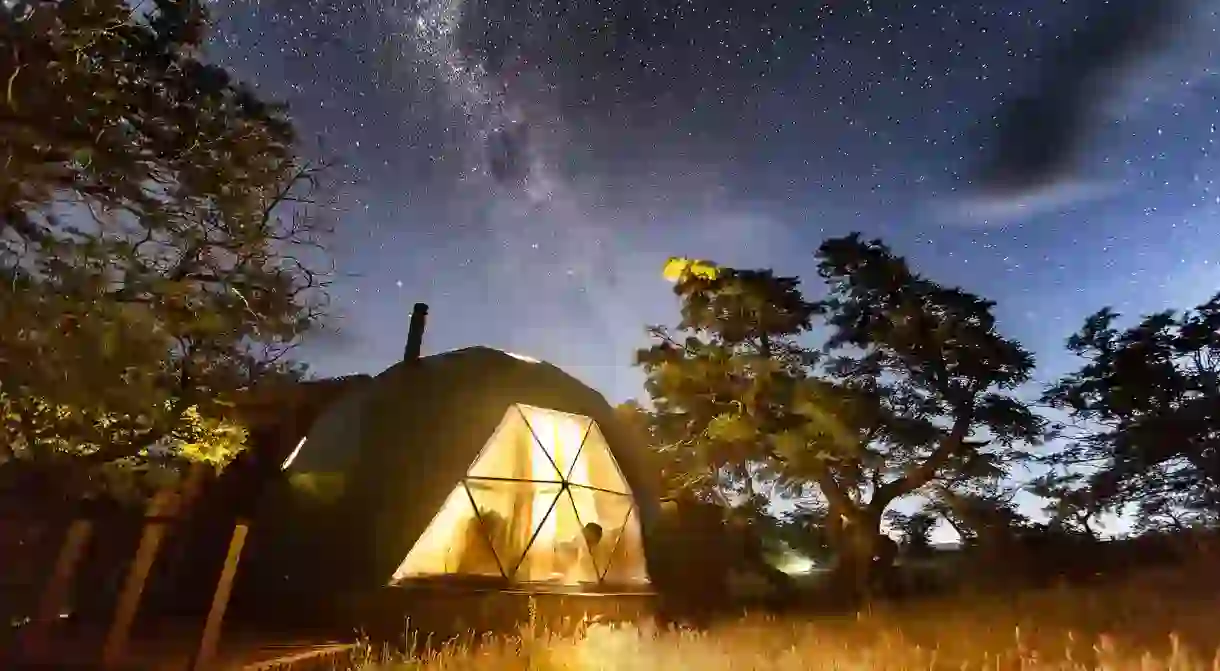8 Reasons Why Chile is Leading the Way in Sustainable Tourism

Thanks to its unrivaled natural beauty, strong economy and forward-thinking government initiatives, Chile has become a world leader in sustainable tourism. Adventure tourism has been doing particularly well on the sustainability front, although effective government incentives have seen plenty of eco-friendly hotels pop up around the country as well. Let’s take a look at what the government is doing to encourage this booming sector and how private industry has also gotten on board.
Sustainable adventure tourism is huge
So big, in fact, that a 2012 study by the Adventure Tourism Development Index awarded Chile the top spot among all developed countries worldwide. So what exactly is adventure tourism and why is Chile so good at it? The study defined it as a holiday that includes three main elements.
Natural interaction: Chile has no shortage of national parks and pristine wilderness. From the surreal desert landscapes of the Atacama, to the lush lake district and the raw wilderness of Patagonia, nature is a key selling point for Chilean tourism.

Cultural interaction: Although many consider Chile to be fairly westernized compared to its Andean neighbors, the country does have a strong culture and arts scene, not to mention a proud indigenous people who still retain their pre-colonial traditions.
Physical interaction: An impressive array of adventure activities are available right throughout the country which take full advantage of the spectacular scenery on offer. Examples include kayaking the majestic southern fjords, hiking the incredible Torres del Paine, cycling around the tranquil lake district, rafting the rapids of the Maipo River, discovering Patagonia on horseback and skiing in Valle Navarro.

A liberal economy that encourages entrepreneurship as well as strict safety standards, excellent nationwide healthcare, well-developed tourism infrastructure and an abundance of natural wonders have paved the way for Chile to become one of the world’s leading sustainable adventure tourism destinations.
The government cares about sustainable tourism
The Chilean government recognizes the huge potential of their eco-tourism industry and understands it must be sustainable to provide long term financial benefit. In 2010, tourism was identified as a growth key industry so a target was set to raise its contribution to GDP to 6% (USD$15.5 b) over a 10 year period. In order to promote sustainability, The National System for Distinction of Sustainable Tourism was created to certify and award sustainable tourism ventures. On the flip side, the government also closely monitors and sanctions companies who do the wrong thing. Their vision is that, ‘by 2020, Chile will be recognized as a world class destination, being admired and known for its attractive, varied, sustainable and high quality tourism.’

Bird Chile Nature Tours
Plenty of private business have gotten on board the sustainable tourism bandwagon. One such company is Bird Chile Nature Tours who were declared the Most Sustainable Tourism Company by Chile’s Federation of Tourism Businesses (Fedetur) in 2016. The agency offers birding tours throughout the country and were recognized for their strict adherence to the seven leave no trace principals.

EcoCamp Patagonia
Situated in the heart of Torres del Paine National Park, EcoCamp Patagonia is the country’s most sustainable eco-resort. Consisting of various low impact domed structures, this is the only resort in Patagonia to boast a government certified Environmental Management System, making it the benchmark for sustainable tourism in the region. The domes are based on a design originally conceived by nomadic indigenous people and are built to receive ample natural light, while a series of solar panels and small hydroelectric generators power the facility. All food is sourced from the local area and all decorations have been created by local artisans, subsequently reducing CO emissions which has enabled the resort to claim a carbon neutral status since 2008. Even human waste is carefully managed through a complex composting system of which refuse is donated to a nearby pig farm.

Tierra Patagonia Hotel & Spa
This luxury hotel on the edge of Torres del Paine is doing its bit to rejuvenate the large section of forest lost to a devastating fire in 2011. Upon booking, each guest receives a code for a virtual seed. The guest chooses where in the park they would like their seed to be planted and later receives an email with GPS coordinates of the new sapling. Aside from this innovative reforestation program, Tierra Patagonia sources its furniture and textiles from local artisans who use native materials and implement eco-friendly electricity and waste water systems.
Remota Hotel
Just outside Puerto Natales, this five-star eco-hotel is a great option for those looking to explore Patagonia in comfort while making minimal impact on the environment. The building features natural grass planted on the roof, an efficient waste water system and a sustainable architectural design that incorporates maximum sunlight exposure. Furthermore, their nature excursions into nearby wilderness strictly adhere to the leave no trace principals.

Patagonia Camp
Touting itself as Chile’s first luxury eco-camp, Patagonia Camp consists of 20 opulent yurts connected by a series of walkways and common areas. The resort takes sustainability seriously by thoroughly treating waste water, offering 100% biodegradable amenities, composting food waste into the restaurant’s herb garden and recycling materials wherever possible. Most notable, however, is the fact that the entire camp has been constructed on raised pillars to avoid damaging the fragile fauna below.

explora Rapa Nui
This sophisticated eco-resort was determined to be in an area of no archaeological significance before construction began and respects mother nature through various energy, water and recycling initiatives. However, its standout ecological appeal is that the entire complex was the first hotel in Latin America to achieve LEED (Leadership in Energy and Environmental Design) certification, a strict international recognition that has only been awarded to a handful of hotels worldwide. It’s the perfect choice for the environmentally conscience traveler in Easter Island.













